Guest editorial by Ernest A. Canning

Citizens United rejected a congressional legislative ban on corporate campaign contributions. It says nothing about the ability to tax such contributions...
'A date which will live in infamy'
Jan. 21, 2010 has become, as we predicted it would be, "a date which will live in infamy."
That was the day when five GOP-appointed members of the US Supreme Court (four linked to the radical-right Federalist Society) handed down Citizens United vs. Federal Election Commission [PDF]. The decision extended an unfettered First Amendment right to the billionaires at the pinnacle of private totalitarian entities (corporations) to buy politicians and bombard the nation with political propaganda. The right was given even if those controlling the corporations could not themselves be extended the same rights as U.S. "citizens" because they are foreigners --- perhaps even foreign governments with controlling ownership interests in the newly-erected notion of "corporate citizens."
With the corporate-owned media in firm control of the primary means of mass communication and our supposedly "public airwaves," the corporate-purchased message becomes the only message. Corporate wealth can, and, so far during this election cycle has, easily drowned out the right of ordinary citizens to be heard at any meaningful level.
The all-pervasive corporate message serves to virtually bury access to basic knowledge that is vital to a vibrant democracy. That is a far cry from what the framers of the U.S. Constitution envisioned.
As James Madison astutely observed:
On Dec. 7, 1941 the Empire of Japan delivered a severe blow to our naval forces at Pearl Harbor. The damage wrought by the these five "radicals-in-robes" on Jan. 21, 2010, while less immediately deadly, was, in fact, far more harmful to the nation. They drove a quasi-legal dagger into the heart of our constitutional democracy, paving the road towards a tyrannical corporate security state.
Widespread Revulsion
Widespread revulsion is reflected by a recent Washington Post/ABC News poll reflecting that nearly seven in ten Americans "strongly" believe that super PACS should be banned --- another 15% who "somewhat" believe that --- and by the growing number of cities who have signed onto a proposed constitutional amendment that would not only reverse Citizens United but end corporate personhood. That revulsion is also reflected by Western Tradition Partnership, Inc. vs. Attorney General of Montana [PDF], a Montana Supreme Court decision which upheld that state's anti-corruption laws banning corporate campaign contributions --- a case in which even the dissenting opinion by Justice James C. Nelson referred to the very concept of corporate personhood as "an affront to the inviolable dignity of our species."
Solutions
While it is indeed possible, but not probable, that Justice Anthony Kennedy, author of the infamous Citizens United decision, could seize upon the Montana decision as an opportunity for a "do-over," the future of our constitutional democracy should not rest on so slender a reed as one Justice's conscience. Move to Amend, whose slogan is "We the People, Not We the Corporations," should press forward with its efforts to seek a constitutional amendment.
In the interim, MoveOn member Peter J. Nelson, has come up with a brilliant temporary fix --- "Tax the Super-PACS."
My additions to the Nelson proposal would be to set that tax at the same level as the top tax bracket during the Eisenhower administration --- 91%. Also, as the principal beneficiaries of Super-PAC monies are the corporate media outlets who ultimately receive them --- media outlets that long ago abandoned the role envisioned by the First Amendment as a Fourth Estate that insures that the electorate is fully informed --- the appropriate point to impose such a tax would be to attach it to the purchase of ads. That way, where Nelson's petition is directed only to the U.S. House and Senate, state legislatures could increase much needed revenue by taxing Super-PAC monies that seek to purchase ads in local and state elections.
We would also need to remove the IRS 501(c)(4) designation for groups like Karl Rove's American Crossroads, which has pledged to raise and spend $300 million for the 2012 campaign. Pro Publica reports that "non-profit" designation makes it possible for corporations to seek tax credits for the political "dark money" they donate to Super-PACS.
A petition to tax the Super-PACS can be signed here.
UPDATE: The CA state assembly passed AJR 22, a resolution calling upon the U.S. Congress to pass a constitutional amendment to overturn Citizens United and to send it to the states for ratification. A CREDO Action petition calling upon the CA state senate to pass AJR 22 can be signed, here.
Also, Sen. Jeff Merkley (D-OR) is circulating a petition to the IRS to prevent groups like Rove's Crossroads and the Koch Brothers' Americans for Prosperity from evading donor disclosure requirements by masquerading as "social welfare" organizations. That petition can be signed, here.
Ernest A. Canning has been an active member of the California state bar since 1977. Mr. Canning has received both undergraduate and graduate degrees in political science as well as a juris doctor. He is also a Vietnam vet (4th Infantry, Central Highlands 1968). Follow him on Twitter: @Cann4ing.


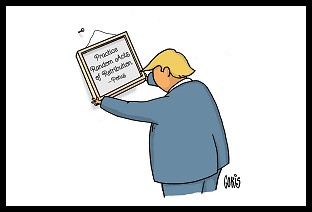 Sunday 'Random Acts of' Toons
Sunday 'Random Acts of' Toons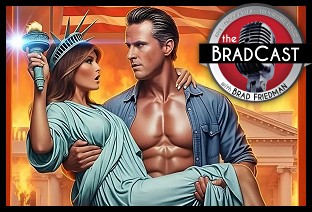 From CA's 'Nuclear Deterrence' Map to Newsom's Trolling to Trump's 'Fascist Theatre' and Beyond: 'BradCast' 8/21/25
From CA's 'Nuclear Deterrence' Map to Newsom's Trolling to Trump's 'Fascist Theatre' and Beyond: 'BradCast' 8/21/25 'Green News Report' 8/21/25
'Green News Report' 8/21/25
 On 'Americanism' and Trump's 'Stalinesque' Plot to Whitewash U.S. History: 'BradCast' 8/20/25
On 'Americanism' and Trump's 'Stalinesque' Plot to Whitewash U.S. History: 'BradCast' 8/20/25 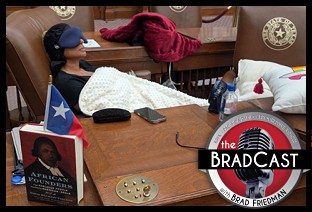 Texas GOP Imprisons Dem State Lawmaker in State House Chamber: 'BradCast' 8/19/25
Texas GOP Imprisons Dem State Lawmaker in State House Chamber: 'BradCast' 8/19/25 'Green News Report' 8/19/25
'Green News Report' 8/19/25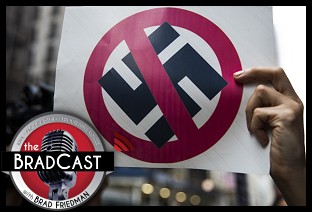 Trump, Nazis and
Trump, Nazis and  Sunday '
Sunday '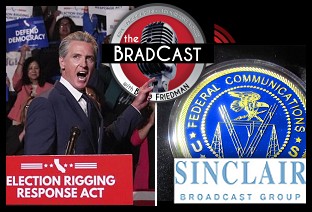 Newsom's 'Election Rigging Response Act'; FCC's License Renewal for Sock-Puppeting Sinclair: 'BradCast' 8/14/25
Newsom's 'Election Rigging Response Act'; FCC's License Renewal for Sock-Puppeting Sinclair: 'BradCast' 8/14/25 'Green News Report' 8/14/25
'Green News Report' 8/14/25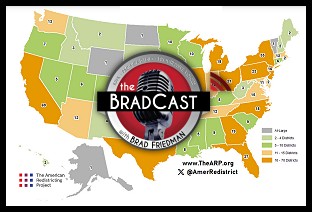 140 New House Reps?: Moving Beyond the Gerrymandering Wars: 'BradCast' 8/13/25
140 New House Reps?: Moving Beyond the Gerrymandering Wars: 'BradCast' 8/13/25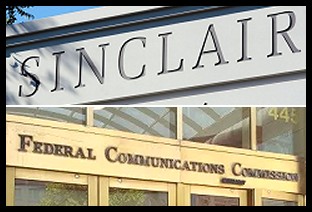 FCC Renews Sinclair TV Licenses Despite Complaint from Petitioner Who Died Waiting
FCC Renews Sinclair TV Licenses Despite Complaint from Petitioner Who Died Waiting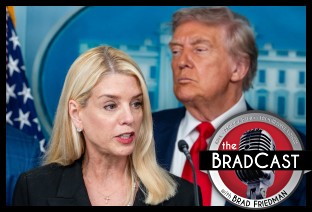 It's Not About the Rule of Law, It's About Authoritarian Control: 'BradCast' 8/12/25
It's Not About the Rule of Law, It's About Authoritarian Control: 'BradCast' 8/12/25 'Green News Report' 8/12/25
'Green News Report' 8/12/25 After Vaccine Cancels, CDC Shooting, Former Officials Want RFK Out: 'BradCast' 8/11/25
After Vaccine Cancels, CDC Shooting, Former Officials Want RFK Out: 'BradCast' 8/11/25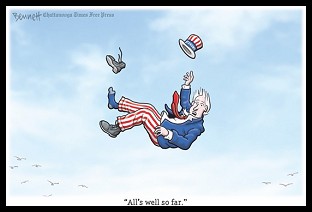 Sunday 'All's Well' Toons
Sunday 'All's Well' Toons 'Green News Report' 8/7/25
'Green News Report' 8/7/25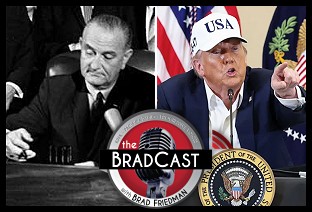 Trump Wars Against Greem Energy, Democracy on VRA's 60th: 'BradCast' 8/7
Trump Wars Against Greem Energy, Democracy on VRA's 60th: 'BradCast' 8/7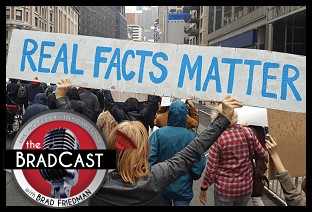 Media Conglomerates Continue Trump Capitulation: 'BradCast' 8/6/25
Media Conglomerates Continue Trump Capitulation: 'BradCast' 8/6/25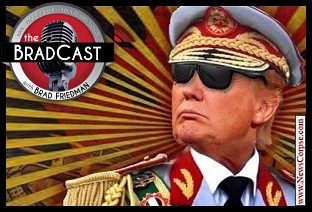 Banana Republican: Trump Shoots the Labor Statistics Messenger: 'BradCast' 8/5/25
Banana Republican: Trump Shoots the Labor Statistics Messenger: 'BradCast' 8/5/25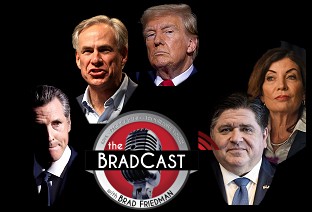 All's Fair in Love, War and, Apparently, Part-isan Gerrymandering: 'BradCast' 8/4/25
All's Fair in Love, War and, Apparently, Part-isan Gerrymandering: 'BradCast' 8/4/25 The Art of the Corrupt, Phony, Unlawful, Pretend Trade Deal: 'BradCast' 7/31/25
The Art of the Corrupt, Phony, Unlawful, Pretend Trade Deal: 'BradCast' 7/31/25 Battle Begins Against Trump EPA Climate Regulations 'Kill Shot': 'BradCast' 7/30/25
Battle Begins Against Trump EPA Climate Regulations 'Kill Shot': 'BradCast' 7/30/25 A Pu Pu Platter of Trump Corruption: 'BradCast' 7/29/25
A Pu Pu Platter of Trump Corruption: 'BradCast' 7/29/25 'Catastrophic' GOP Cuts to Medicaid, Medicare, ACA: 'BradCast' 7/28/25
'Catastrophic' GOP Cuts to Medicaid, Medicare, ACA: 'BradCast' 7/28/25
 VA GOP VOTER REG FRAUDSTER OFF HOOK
VA GOP VOTER REG FRAUDSTER OFF HOOK Criminal GOP Voter Registration Fraud Probe Expanding in VA
Criminal GOP Voter Registration Fraud Probe Expanding in VA DOJ PROBE SOUGHT AFTER VA ARREST
DOJ PROBE SOUGHT AFTER VA ARREST Arrest in VA: GOP Voter Reg Scandal Widens
Arrest in VA: GOP Voter Reg Scandal Widens ALL TOGETHER: ROVE, SPROUL, KOCHS, RNC
ALL TOGETHER: ROVE, SPROUL, KOCHS, RNC LATimes: RNC's 'Fired' Sproul Working for Repubs in 'as Many as 30 States'
LATimes: RNC's 'Fired' Sproul Working for Repubs in 'as Many as 30 States' 'Fired' Sproul Group 'Cloned', Still Working for Republicans in At Least 10 States
'Fired' Sproul Group 'Cloned', Still Working for Republicans in At Least 10 States FINALLY: FOX ON GOP REG FRAUD SCANDAL
FINALLY: FOX ON GOP REG FRAUD SCANDAL COLORADO FOLLOWS FLORIDA WITH GOP CRIMINAL INVESTIGATION
COLORADO FOLLOWS FLORIDA WITH GOP CRIMINAL INVESTIGATION CRIMINAL PROBE LAUNCHED INTO GOP VOTER REGISTRATION FRAUD SCANDAL IN FL
CRIMINAL PROBE LAUNCHED INTO GOP VOTER REGISTRATION FRAUD SCANDAL IN FL Brad Breaks PA Photo ID & GOP Registration Fraud Scandal News on Hartmann TV
Brad Breaks PA Photo ID & GOP Registration Fraud Scandal News on Hartmann TV  CAUGHT ON TAPE: COORDINATED NATIONWIDE GOP VOTER REG SCAM
CAUGHT ON TAPE: COORDINATED NATIONWIDE GOP VOTER REG SCAM CRIMINAL ELECTION FRAUD COMPLAINT FILED AGAINST GOP 'FRAUD' FIRM
CRIMINAL ELECTION FRAUD COMPLAINT FILED AGAINST GOP 'FRAUD' FIRM RICK SCOTT GETS ROLLED IN GOP REGISTRATION FRAUD SCANDAL
RICK SCOTT GETS ROLLED IN GOP REGISTRATION FRAUD SCANDAL VIDEO: Brad Breaks GOP Reg Fraud Scandal on Hartmann TV
VIDEO: Brad Breaks GOP Reg Fraud Scandal on Hartmann TV RNC FIRES NATIONAL VOTER REGISTRATION FIRM FOR FRAUD
RNC FIRES NATIONAL VOTER REGISTRATION FIRM FOR FRAUD EXCLUSIVE: Intvw w/ FL Official Who First Discovered GOP Reg Fraud
EXCLUSIVE: Intvw w/ FL Official Who First Discovered GOP Reg Fraud GOP REGISTRATION FRAUD FOUND IN FL
GOP REGISTRATION FRAUD FOUND IN FL

































